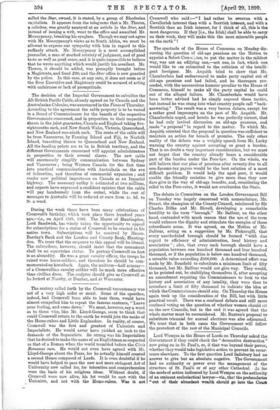The spectacle of the House of Commons on Monday dis-
cussing the question of old-age pensions on the Motion to appoint a Select CoinviLtee, to put the matter in the mildest way, was not an edifying one,—not one, in fact, which one would like to see submitted to the criticism of the intelli- gent foreigner. Mr. Asquith tried to show that Mr. Chamberlain had endeavoured to make party capital out of old-age pensions and had failed, and he thereupon pro- ceeded, with the unconscious humour peculiar to the House of Commons, himself to make all the party capital he could out of the alleged failure. Mr. Chamberlain would have been better advised had he simply exposed these tactics, but instead he was stung into what country people call "back- answering." The result was a very barren debate, except for a rather good impromptu on the part of Mr. Asquith. Mr. Chamberlain urged, and herein he was perfectly correct, that he had only invited discussion on old-age pensions, and made "a proposal" in regard to the matter. To which Mr. Asquith retorted that the proposal in question was sufficient to maintain an action for breach of promise. The only other reality of the debate was a weighty speech from Mr. Leeky warning the country against accepting so great a burden. That is no doubt a very important consideration, but we must not forget that the country already bears a considerable part of the burden under the Poor-law. On the whole, we still believe that our plan of pensions after seventy-five to all non-Income-tax payers would be the best solution of a most difficult problem. It would help the aged poor, it would enable the friendly societies to give more than they now dare give in the way of old-age benefits, and, considering the relief to the Poor-rates, it would not overburden the State.






















































 Previous page
Previous page